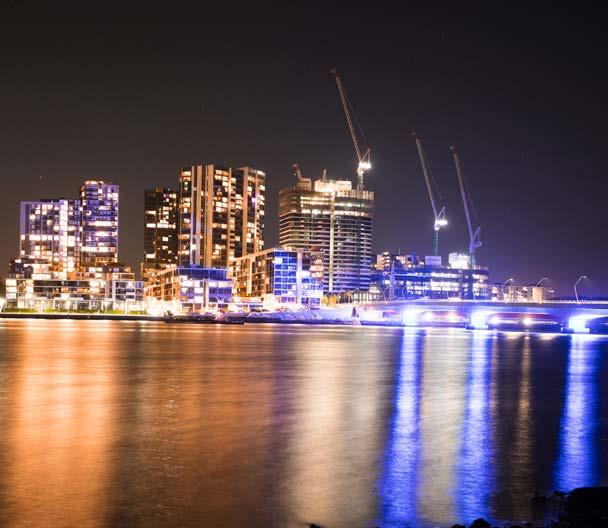Emerging Trends
Policy Context State Government The New South Wales Government has introduced a 24-hour Economy Strategy to restore, revive and regenerate Sydney’s night-time economy. The strategy lays out the blueprint for making Sydney a 24-hour global city1 as it recovers from the COVID–19 pandemic and the long-term impacts of the lockout laws.
03
Local Government
City of Canada Bay
Local Government NSW set up a night-time economy taskforce2 to support local councils evolving policies for their communities who desired a more vibrant night-time economy. Local Government has a lead role in local planning and development, it has the skills, experience and the knowledge of local communities. Council’s work is embedded in the commitments identified in its Community Strategic Plan and Local Environmental Plan. The need for a more strategic approach to support evening activation and programming across local village centres is growing.
The Rhodes Peninsula Place Plan , Five Dock Town Centre Urban Design Study4, The Mortlake and Majors Bay Road Place Plans5, and most recently the Drummoyne Urban Design Study6 all reference the need for more evening and night-time activation being desirable. 3
A heightened trend through the COVID–19 pandemic has seen our communities needing to remain hyper-local for their work, play, recreation and shopping. Our community are turning to our centres for needs beyond what was previously found or offered. There is now opportunity for our village centres to diversify the current offer and experience beyond the top four employment industries in the local area — health, realty, financial and technical services.
Summary of demand forces: Political:
Cultural:
Global City – all globally significant cities have a vibrant Night Time Economy (NTE). Sydney is emerging as one and is strengthening its development.
Cultural activities and industries8 are key to activation. Live music and performance offer attractors which feed the wider evening and night-time economy.
State Government - blueprint for a night-time economy and COVID–19 economic crisis recovery pathway.
Evening economy investment is widely acknowledged as vital to reinvigorate the hardest-hit cultural industries post COVID– crisis.
NSW Planning Guide7 for establishing and managing night time economy uses.
The new vision for the night-time economy is about more than alcohol-based sales and venues.
Local Government – LGNSW policy priority area.
Flexible public spaces emerging across Sydney to enable busking, street stalls, pop-ups and performer licenses to allow culture to happen where there is no infrastructure.
Lockout laws depressed the market and a lobby emerged to address this deficit — this industry lobby is driving new opportunities.
Economic:
Social:
Enabling business to increase their capacity, tackling inactive economic spaces.
Place-based strategies, involve business, government and community stakeholders developing a shared vision for an area. These shared visions are driving demand for more activities.
Increase jobs, stimulate and drive the NTE. Tourism attractor, need to boost the visitor economy to help business. Night time economy is an essential pillar of the growing experience economy.
Hyper-localism — people spend most of their time in the neighbourhood they live in and want to see and experience more in their local area.
04
As people work longer hours they need services to be open later to meet their social needs.



